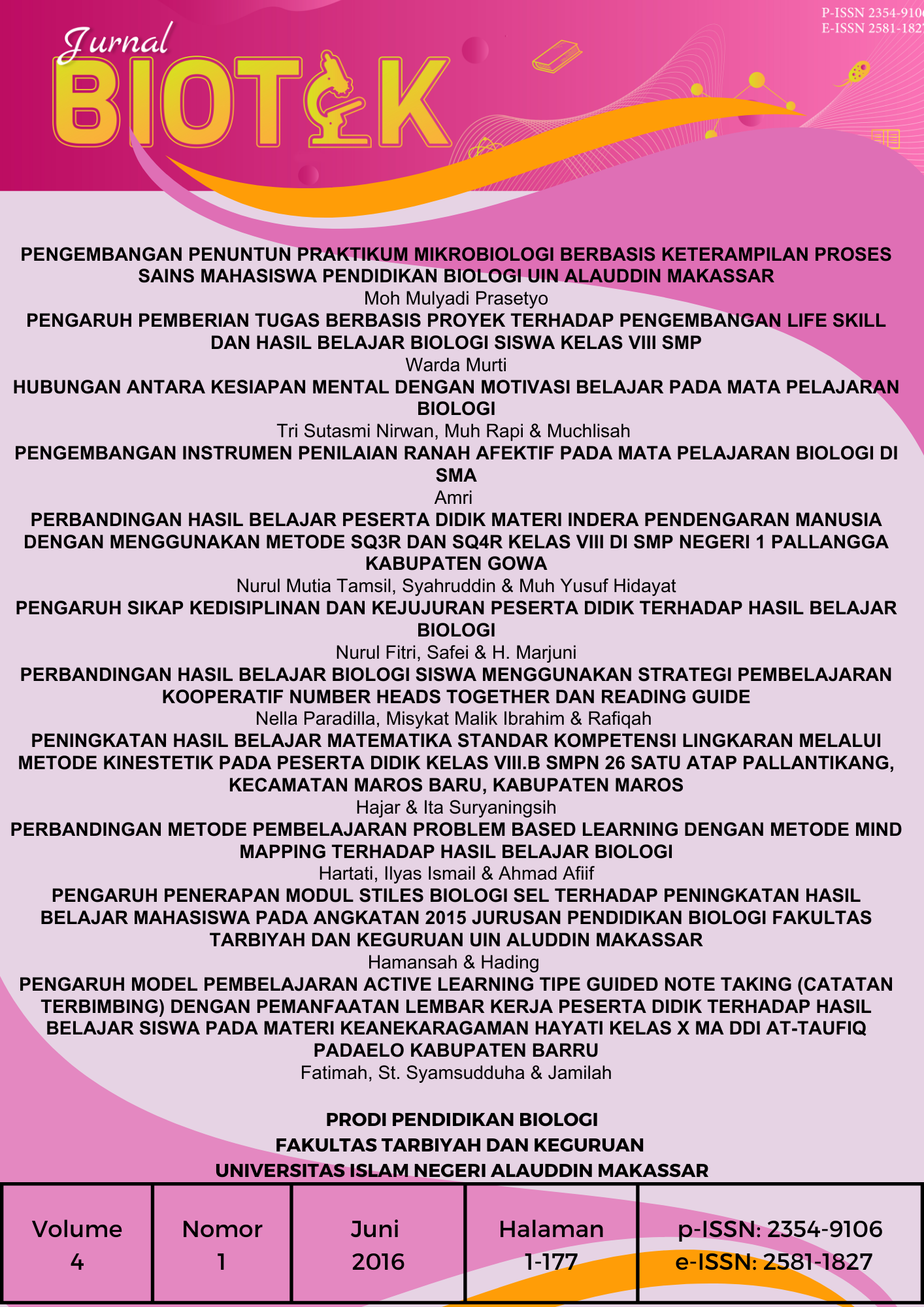PERBANDINGAN HASIL BELAJAR BIOLOGI SISWA MENGGUNAKAN STRATEGI PEMBELAJARAN KOOPERATIF NUMBER HEADS TOGETHER DAN READING GUIDE
Abstract
This research aimed (1) To find out the student’s learning outcomes by using learning strategies Numbered Heads Together (NHT) on the material digestive system for students of class XI MAN Pinrang, (2) To find out the student’s learning outcomes by using a learning strategies Reading Guide on material digestive system for students of class XI MAN Pinrang and (3) To find out a significant differences between the results of student’s learning by using learning strategy Numbered Heads Together (NHT) than students who using learning strategy Reading Guide on material digestive system for all students of class XI MAN Pinrang.
The type of research used in this study was a quasi-experimental research (quasi- experimental) that used the design of Nonequivalent Control Group Design. The populations in this research were all students of class XI MAN Pinrang in academic year 2015/2016 which consisted of six classes. The technique of sampling used in this research was simple random sampling, selected as the first experimental class was the class XI IPA4 as many as 37 students and selected as second experimental class II was the class XI IPA6 as many as 37 students. Technique of collecting data used by using a test instrument that has multiple choice questions of 25 questions relating to the material digestive system and observation sheet. Technique of data analysis used the descriptive statistical analysis and inferential statistical analysis.
The results obtained in both groups through a descriptive statistical analysis were, the average results of studying biology by using learning strategy Numbered Heads Together (NHT) at = 75.16 while the average result of studying biology by using learning strategy Reading Guide amounted to 75.43. The results of inferential data analysis showed that significant value was obtained thitung 9.734> ttabel 1.998 and significance (0.000 <0.05). So, it can be concluded that there were significant differences by using learning strategies between Numbered Heads Together (NHT) with Reading Guide on biology learning outcomes for students of class XI at MAN Pinrang.
Downloads
References
Amborowati. (2015). Peningkatan Keterampilan Meringkas Isi Bacaan Cerita Melalui Model Pembelajaran Reading Guide Pada siswa Kelas V SDN Sumbersoko 02 Tahun Pelajaran 2013/2014. http://www.pbsb- psma.org/content/blog/penerapan-strategi-belajar-aktif-tipe-reading-guide- kepada-siswa (Diakses 04 November 2015).
Anas, Sudijono. (2010). Statistik Pendidikan. Jakarta: Raja Grafindo Persada.
Benny, Pribadi, A. (2012). Model Desain Sistem Pembelajaran. Jakarta: Dian Rakyat.
Endang, Mulyatiningsih. (2013). Metode Penelitian Terapan Bidang Pendidikan. Bandung: Alfabeta.
Huda Miftahul. (2011). Cooperatif Learning. Yogyakarta: Pustaka Belajar.
Ihsan, Fuad. (2005). Dasar-Dasar Kependidikan. Jakarta: Rineka Cipta.
Isjoni. (2012). Pembelajaran Kooferatif. Yogyakarta: Pustaka Pelajar.
Istiningrum, Sukanti. (2012). Journal Pendidikan Akuntansi Indonesia, Vol. X, No. 2 tahun 2012. http://www.repository.library.uk. (Diakses 4 November 2015).
Mulyono Abdurrahman. (2003). Pendidikan Bagi Anak Berkesulitan Belajar. Jakarta: Rineka Cipta.
Nurhera. (2010). Media Pembelajaran Visual dan Media Audio Visual Pada Mata Pembelajaran Sistem Reproduksi Manusia. Makassar: UIN Press.
Rustaman et al. (2003). Strategi Belajar Mengajar Biologi. Bandung: UPI.
Sanjaya, Wina. (2010). Strategi Pembelajaran Berorientasi Standar proses Pembelajaran. Jakarta: Kencana.
Sugiyono. (2010). Metode Penelitian Pendidikan Pendekatan Kuantitatif, Kualitatif, dan R&D. Bandung: Alfabeta.
Suryabrata, Sumadi. (2006). Psikologi Pendidikan. Cetakan V. Jakarta: Raja Grafindo Persada.
Zaini, Hisyam Bermawy Munthe dan Sekar Ayu Aryani. (2008). Strategi Pembelajaran Aktif. Yogyakarta: Pustaka Insan Madani.
Authors who publish with Jurnal Biotek agree to the following terms: Authors retain the copyright and grant Universitas Islam Negeri Alauddin Makassar right of first publication with the work simultaneously licensed under a Creative Commons Attribution License (CC BY-SA 4.0) that allows others to share (copy and redistribute the material in any medium or format) and adapt (remix, transform, and build upon the material) the work for any purpose, even commercially with an acknowledgement of the work's authorship and initial publication in Universitas Islam Negeri Alauddin Makassar. Authors are able to enter into separate, additional contractual arrangements for the non-exclusive distribution of the journal's published version of the work (e.g., post it to an institutional repository or publish it in a book), with an acknowledgement of its initial publication in Universitas Islam Negeri Alauddin Makassar. Authors are permitted and encouraged to post their work online (e.g., in institutional repositories or on their website) prior to and during the submission process, as it can lead to productive exchanges, as well as earlier and greater citation of published work (See The Effect of Open Access).

This work is licensed under a Creative Commons Attribution-ShareAlike 4.0 International License.



